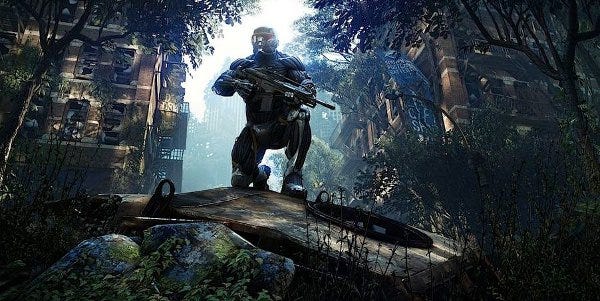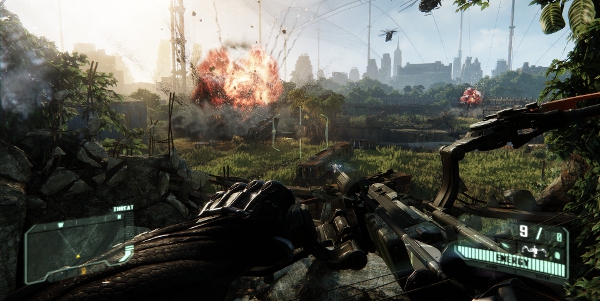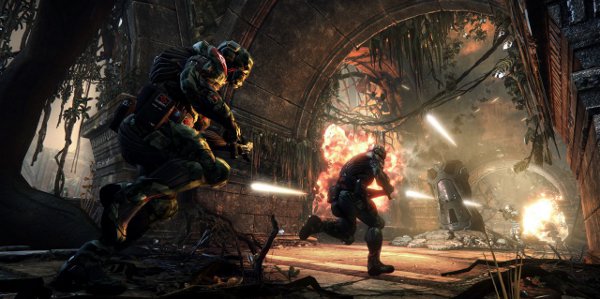Crytek's CEO On Crysis 4, Homefront 2, The Future
Wherefore Warface?
If you climb to the top of Mt Videogameland, you'll see that Crysis 3 is just over the thoroughly tessellated, HDR-lit horizon. That, however, is hardly the only thing that's got Crytek's tear-powered mega-lair whirring along at maximum efficiency. There's also Homefront 2, Warface, Ryse, an entire F2P social platform, piracy concerns, and a brand new Crysis - which is totally not Crysis 4, but also kind of is. I spoke with Crytek CEO Cevat Yerli about all of this things and also asked him the question that's almost certainly been devouring your every idle thought for far too many months: why's it called "Warface"?
RPS: You recently announced that Crysis 3 will have a full suite of graphical bells, whistles, and settings options out of the probably-not-a-box. That's quite the turnaround from Crysis 2, obviously. What happened there, though? In retrospect, do you think you underestimated how much these types of things matter to some players?
Cevat Yerli: It was, to be honest, a consequence of Crysis 1. In Crysis 1, many people complained about the high specs. Many people couldn't play it. Or many people saw that they couldn't. Because when many people say, "I can't play," they always assume they can't maximize it. But that was completely intentional, because we were building a future-proof game. A future-proof game by definition doesn't run at its highest settings on today's machines. So that was our philosophy. Let's give this a four year lifespan on PC specs.
That was our intention, but it backfired in Crysis 1. So then we said, "OK, Crysis 2. Let's make it much more accessible, so that people can max it out quickly." We approached the whole production very differently. But then people [got upset about that]. So it backfired again [laughs]. So now we're making Crysis 3 accessible at the low end, but really pushes the future-proof graphics at the high end. In a way, it's the best of both worlds.
RPS: The best of both worlds thing has definitely been a focus of your promotional efforts for the game. "It's your favorite bits of Crysis 1 meets all the good stuff from Crysis 2," etc. But, in going that route, is there a risk of creating a risk-free jack-of-all-trades, master-of-none?
Cevat Yerli: I don't think so, because we're not really mixing in a literal sense like that. It's more like, "What is the gist that people really like about Crysis?" And we know that, because we created the game. Same with the gist of what doesn't work in Crysis 2. Luckily, these are very complimentary things. So, for instance, Crysis 2 was perceived as too narrow and linear, because of the inherent consequence of going urban. Urban environments have to put buildings in front of you. Their structures aren't as vast and expansive.
Now, we didn't want to get rid of that completely, but also we wanted to have very expansive areas. So we decided to take a 70/30 kind of approach, which is 70 percent nature and 30 percent urban. We wanted to make an environment that's never been done before: the urban rainforest. From a fiction perspective, it also made sense, because this is like a terraforming operation to cleanse the alien remainders.
From a gameplay experience, it allowed us to take advantage of a very open experience - at times even more open than Crysis 1 - but still have the visual reach and detail-oriented uniqueness of Crysis 2. Because Crysis 2 had so much production value put into it, and we didn't want to lose that. And I think people will appreciate it, because our Seven Wonders are much more than just seven environments. They're different in terms of weapon choices, the preferred way you play, the way the AI works, sound effects, storyline - all of that.
RPS: You've spoken a bit about the next Crysis - mostly about your plan to do something very, very different. So much so that you don't feel comfortable calling it Crysis 4. What does that mean, though? And why take this gamble now? Do you think Crysis is in danger of getting stale?
Cevat Yerli: Well, it's too early to really talk about it, because we don't know yet. With Crysis 1, 2, and 3, we knew roughly. So even after Crysis 1, we knew what the next one's could be – the different options of where we could take it. We stayed true to that. The technology and the storyline and whatnot.
But that's all coming to an end in Crysis 3. With the next Crysis, we have the creative freedom to depict some of the things we couldn't do otherwise. Some of the new ideas we'd like to do with the world. Some of the new ideas we'd like to do with the cast, and with bringing new characters and enemies to the table. We couldn't do those things if we were shipping it in the current fiction. So we want to the opportunity to reinvent Crysis.
RPS: You've been all about free-to-play lately, so will the next Crysis be designed around that?
Cevat Yerli: It's too early to say [whether the next Crysis will be F2P]. I don't think F2P's a mutually exclusive way of looking at things. I mean, the future is definitely free-to-play, but likewise, retail can co-exist with it. Premium games can be free-to-play. When I said free-to-play's gonna be our future, I meant that and I hold to it. But I didn't mean it for tomorrow. When I say there will inevitably be only free-to-play games, I mean that there might be ones where you can just download them with an free-to-play business model, or you can go to the store and buy it for $60. So that's what I meant: there's gonna be free-to-play available, which brings the entry level down to zero from a price perspective.
But if people like packages or they want to go to the store for a special edition with a nice statue or whatever, then they're going to get that experience. Because that's how games still are for at least another five years. But that amount is fading off every year. So fewer and fewer people are buying packaged goods, and at some point, it'll just be people downloading games and streaming them.
RPS: Actually, I was wondering why you haven't done anything like that with Crysis. I mean, you've been focusing on really making the multiplayer stand on its own, so why not make it, er, standalone?
Cevat Yerli: We even considered a standalone free-to-play version for Crysis 2, to be honest. Launching the single-player as a packaged good and then making multiplayer free-to-play-only. For various reasons, it didn't happen. We also considered that for Crysis 3, and it didn't happen again. There are considerations like that.
That said, I do think there's a way of making a very accessible game package. My desire is that everybody can just play Crysis and don't have to spend money from day one. So people don't have to think, 'Oh, do I really want to pay $50 for that game?' I don't want that question to be asked. I just want them to be able to give it a try. And then they can make their choices about spending money. That's honestly why I'm most excited about free-to-play – regardless of [how it'll impact] storytelling, single-player, multiplayer, and co-op experiences. I think there's an answer to all of those problems.
But players need to be ready for this change – at the benefit of the player. I mean, they can access games for no cost. We're not trying to make life more difficult. We're trying to make it easier.
RPS: There are a few pretty strong arguments against it being easier, though. Most obviously, some approaches to microtransactions make the core game a complete chore for everyone else. Also, there's usually an online requirement, which seems like a convenient way to circumvent piracy. Given how close Crytek's come to sinking in those waters, is that also a factor in your decision to go fully F2P?
Cevat Yerli: Actually, I'd rather have tons of users that are playing Crysis - let's say in a F2P version - and never pay one euro to us, but they play the game and be part of the community. I mean, Warface already works this way for us: there is not a single moment where you're required to pay money. So it's not pay-to-win. It's not "Oops, you can't play this section of the game." But if you want to pay money, you can spend a lot to save time on progression and things like that. So you're buying time or vanity - not content.
What this means is that you can't buy exclusive gameplay. And if somebody pirates a game, it's because they don't want to pay for it. I'd rather have those guys turn into legal users and be part of the community - become part of the progression and the competition - but be fair to each other. That's really what I want: for the community to be connected into one ecosystem. There's no reason to pirate at that point. Why would you pirate a free game? At least, so long as you can play for free forever.
RPS: Way on the other side of the industry spectrum, you're also working on a Kinect arena battler: Ryse. And while it continues your never-ending quest to innovate in the field of creative Y placement, it's sadly not coming to PC. But there's a PC version of Kinect now, so have you considered bringing Ryse over here?
Cevat Yerli: There are currently no plans for a PC version, no. It's certainly worth discussing, though.
RPS: Homefront 2's your other big one, but THQ's currently in all kinds of financial trouble. What's it like creating a game amidst so much uncertainty? Has it influenced any of your development decisions? Is it tempting to pull punches when you're not sure if they'll be worth it in the long run?
Cevat Yerli: Our support and collaboration with THQ has been really strong. But obviously, it's an unsettling experience at times when you read this news [about trouble at THQ]. I mean, we've constantly had a great relationship and communication with THQ's top management. What's more unsettling isn't when we read the news - because we kind of already know these things before the public - but when some of the team members don't know the details, and they get concerned. And then the fanbase gets that way as well. When the fanbase of Homefront or Crytek gets worried, we need to fix that.
That being said, we'll see how it turns out. We know how our relationship is, but we don't know what's happening to fix THQ's financial problems. That's THQ's prerogative. But we have hopes that THQ is going to turn around, and Homefront 2 is a very big part of that turnaround. I would say it's probably the most important project, actually. I would say it's the IP that's most relevant along with Saints Row. Those two are pretty much THQ's flagship.
RPS: What about the general environment surrounding all of this? I mean, publishers like THQ are floundering, and Activision, EA, and Ubisoft are the only ones that are really healthy - at least, financially - anymore. What does that say to you about the health of triple-A gaming? Is it sustainable at its current cost?
Cevat Yerli: I think the field is narrowing not because of cost increases, but because of player changes. Players are moving away from traditional platforms, and traditional publishers aren't covering them yet. That puts a lot of stress on R&D costs, which some companies weren't prepared to take on. So what happens in traditional companies is they focus on more reliable IPs where they know something will be successful because it's already been successful.
As a result, there's less investment in triple-A innovation on traditional platforms and more investments on the new platforms. That can be very costly. If you spend two million on a mobile game and two million more on marketing, you might expect a return worthy of such an investment, but you might get zero out of it. Literally. The mobile market is a very different beast. Same with tablet gaming and browser gaming. So, in order to understand each market, it's a whole different approach to organization and expertise.
EA's doing a good job of that, but many others aren't. It's just the tip of the iceberg right now. Some companies like Activision are resting on their strong IPs like Call of Duty and whatnot. And others have failed to adapt. So I think the industry's in a difficult spot right now. Platforms did not adapt to player styles, and players have wandered away. I hope next-gen as well as the next online platforms are going to fix that.
We're trying to fix that a bit ourselves with Gface. We're launching a social gaming platform that's focusing on triple-A core F2P games. That's gonna be a huge bet for us as a company.
RPS: Are you hoping to eventually bring games from outside of Crytek's library into that fold?
Cevat Yerli: Absolutely. The first phase of Gface is Crytek-developed games, but then we're going to publish F2P games from other developers. And then, in the second phase of Gface, we're going to open up the platform so that people can just publish games themselves into Gface. So Gface is going to be a completely open platform.
RPS: So it's going to be completely user-based and open to everyone on that front? There won't be an approval process along the lines of, say, old-school Steam or something like Greenlight?
Cevat Yerli: Yeah, pretty much. It's more like Facebook or the iOS App Store. There's lots of freedom, but it's curated to some degree. The curation's very lightweight. That said, there are going to be premium partners and game developers with whom we'll have a close relationship. But the idea is to give everyone access to real-time social networking for their games. That's the angle I want to try: how do you make gaming for you and your friends easier and more productive?
RPS: Lastly and most importantly - especially for the future health of the industry - the world must know: why are you calling it "Warface"? The name stands out, sure, but it sounds a bit, er, funny.
Cevat Yerli: Because I think it's very personal. I think it's a very social experience. Yes, it's a very strange word combination, but I wanted to express that it's a truly social FPS game. It's about war on a different scale - between corporate entities - but also, it's a shooter between you and your friends. That implies so many new kinds of possibilities with the social technology that we've invested over the last five years to build. So that's why we as a company keep going back to "face." It's very personal.
RPS: Thank you for your time.






